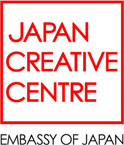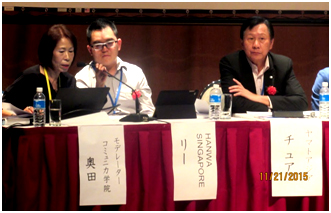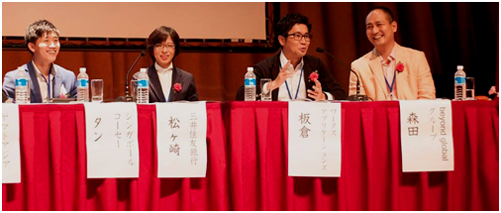Japanese has been the most popular foreign language to study in Singapore since the country gained independence in 1965. In conjunction with its economic development as well as the stable relationship between the two nations, Japanese language education was actively promoted and there has been an increasing number of Japanese language learners each year ever since. Japanese pop-culture such as anime, manga and drama have also sparked Singaporeans to study the language, and over the last decade there have been more than 12,000 studying Japanese each year.
In other to provide support for Japanese language education and its further development in Singapore, the Japanese Language Teachers’ Association in Singapore (JALTAS) was established in year 2000.
Marking the 15th anniversary of the establishment of the Association as well as in response to the great demand for Japanese speaking graduates from Japan related companies, Singapore’s first ever International Conference on Japanese Language Education was conducted over the 21st and 22nd of November, 2015, co-organized with the Business Japanese Group (BJG) of the Society for Teaching Japanese as a Foreign Language of Japan.
The main objective of the conference was to share issues about fostering global human resources in the ASEAN region among Japanese language academics, the government and the private sectors. In the face of globalization over recent years, there is a growing demand for foreign talent, especially talent from ASEAN nations, among Japanese companies, and more and more job recruiters and Japanese corporations are approaching universities to search for new graduates with a good command of Japanese. Thus, the current issue in Japanese language education in Singapore is cultivating students' Business Japanese language competencies.
Around 130 people from Singapore, Japan, ASEAN nations and the USA participated in the conference. Among them were Mr Takeuchi, the Japanese Ambassador to Singapore, and other prominent individuals from leading companies, government organizations and educational institutions.
Speeches by the Co-Chairs of the Conference, myself Dr. Walker, President of JALTAS and Prof. Horii, President of BJG, Mr Takeuchi, Ms Crystal Lim, Director of the Centre for Future Ready Graduates of NUS, and Mr Ogiwara, Director of the Social Exchange Division of the Japanese Association in Singapore marked the start of the conference. Following the opening addresses, sessions continued throughout the day.
In Panel Discussion 1, leading academics from universities in Indonesia, Malaysia, Thailand, Vietnam, Philippines and Singapore shared current issues regarding Business Japanese education in their own countries. From the discussion, it was found that cultivating Business Japanese Competencies is a common challenge among all the nations although the problems each country faces are different, and to tie up with Japanese companies is the key to improve the quality of education.
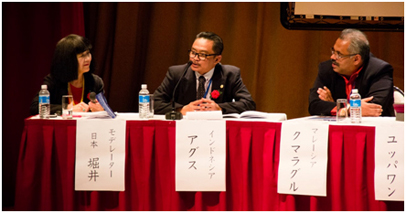 |
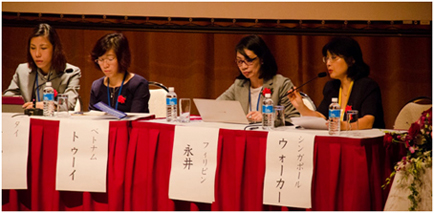 |
In Panel Discussion 2, company executives and graduates working for Japanese companies shared their views on the importance of the Japanese language for Japan related business. A hot discussion was continued by the panellists from various angles about the roles of Japanese language in the current business situation of Japanese companies, and the problems cause by lack of English ability of Japanese employees and cultural differences which are hidden behind the language, etc. After that, participants from the floor actively gave their views on the topic.
In the afternoon, two workshops were conducted by experts on business Japanese education, Japanese language teachers, and business people, and NUS, NTU and SMU students and graduates shared difficulties that both Japanese and non-native Japanese speakers face in the workplace and explored ways to solve such difficulties through case studies and scenarios set by the workshop organisers.
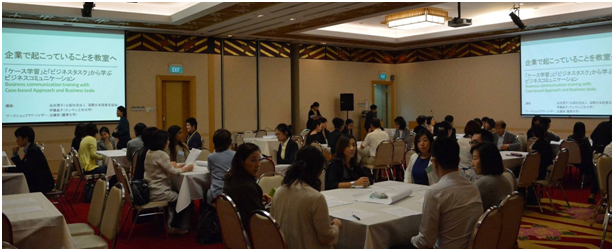
On the second day, 20 research papers were presented by Japanese language researchers and educators through oral and poster presentations, and the latest research findings regarding business Japanese education over the world were shared by the participants.
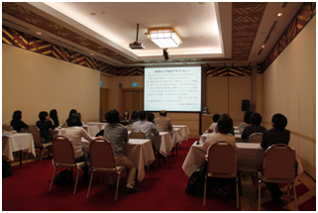 |
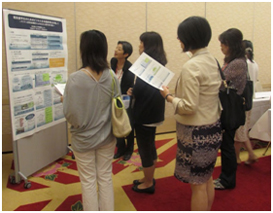 |
Panel Discussion 3 summarized the whole conference and future perspectives of Business Japanese Education. A striking comment expressed through the discussion was that learning Japanese is not merely learning another language but also potentially a life changing factor for learners because Japanese companies are trying hard to globalize by hiring and fostering foreign employees.
Over all, the Conference was a great success in many ways. First, it provided a platform for an active and rewarding information exchange. Second, it helped to share the current situation and issues of business Japanese education from various aspects. Third there were great networking opportunities between the Japanese language educators, government and corporate officials from neighbouring countries and business consultants. There was also a growing understanding of the need for networking and collaboration between the educational institutes, the government and private sectors to overcome many difficulties with fostering and utilizing foreign human resources.
With this success in mind, I would like to continue to build up networking by holding further international conferences in Singapore as the ASEAN hub for global business and Japanese language education.
Finally, I would like to close this with a comment from one of the NUS students who participated in this conference and has just start work in the Tokyo Headquarters of a Japanese company.
“It was particularly interesting as we got to hear varying opinions from individuals who come from different walks of life. Attending the conference was really an experience unlike any other. Seldom does a graduate such as I get the chance to share a table with so many individuals, each an expert in his own field, and even get the chance to share and discuss with them. Listening to their opinions has broadened my own perspective of matters and I am sure that I will be able to understand better the actions of my superiors in the future. Needless to say, being able to communicate in Japanese with so many native Japanese was really a rare opportunity which I thoroughly enjoyed. Through the conference, we were greatly reassured that there are so many prominent Japanese companies from Japan and Singapore who are seeking Japanese speaking graduates, particularly from Singapore.”
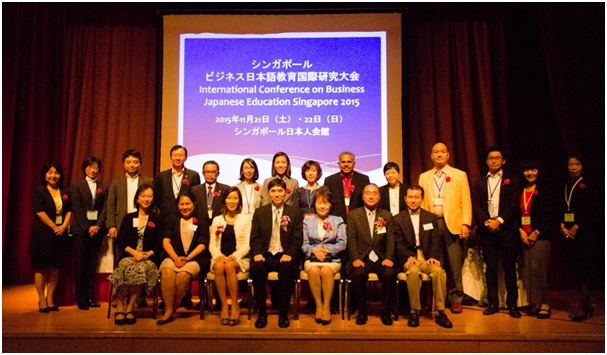 |
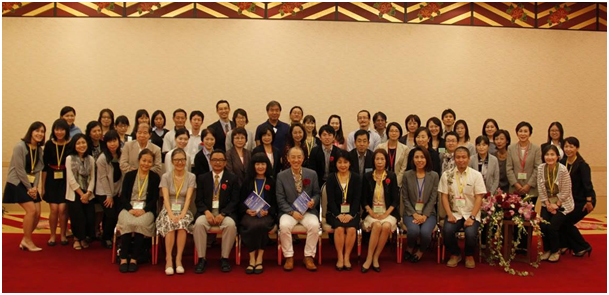 |
Acknowledgement:
I am truly grateful for the cooperation and support from all of the participants and sponsors. In particular, I would like to take this opportunity to express my gratitude to all the panellists, the Japanese Association Singapore, the Japan Foundation, Japan Creative Centre, Embassy of Japan, Mitsui NUS, ASK International, Casio, Mitsubishi Electric, Panasonic Asia Pacific, Prime Travel & Tours, Shizuoka Prefectural Government Representative Office Registered in Singapore, and Works Application. In addition, I would like to thank our special guests from Embassy of Japan, Japan Creative Centre, JCCI, JETRO Singapore, Ministry of Education Language Centre, Centre for Future Graduates, Department of Japanese Studies, and Centre for Language Studies of the National University of Singapore.
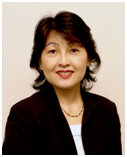
Dr Izumi Walker
Dr Walker is Assistant Director of the Centre for Language Studies and Convenor for the Japanese Language Program at the National University of Singapore. She received an MSc from University of Edinburgh and a PhD from Waseda University. Her specialist area is teaching Japanese for business purposes and she has taught students of various levels from elementary to MBA programs in US, UK and Japan prior to moving to Singapore. She has received Excellent Teaching Awards at the Faculty and/or University level for six consecutive years and is a former board member of the Faculty Excellent Teacher Award Selection Committee. Dr Walker has been the President of the Japanese Language Teachers’ Association in Singapore since 2003.
* All photos and illustrations used in this article are provided by the author / © Dr Izumi Walker


